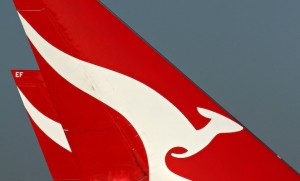
Qantas has recorded an underlying loss before tax of $252 million and a statutory loss after tax of $235 million for the six months to December 31, a figure in line with recent guidance provided by the airline.
The loss comes on the back of $7.9 billion in revenue, a drop of four per cent over the corresponding period last year, and a three per cent reduction in yield.
CEO Alan Joyce attributed the result to “some of the toughest conditions Qantas has ever seen” including “a giant wave of international airline capacity” since 2009 which he said is more than double the global increase over the same period.
Joyce also pin-pointed the Qantas Sale Act as a causal factor of the airline’s woes. “The Australian domestic market has been distorted by current Australian aviation policy, which allows Virgin Australia to be majority-owned by three foreign government-backed airlines and yet retain access to Australian bilateral flying rights,” he said. “Late last year, these three foreign-airline shareholders invested more than $300 million in Virgin Australia at a time when, as Virgin Australia reported to the ASX on 6 February, it was losing money. That capital injection has supported continued domestic capacity growth by Virgin Australia despite its growing losses.”
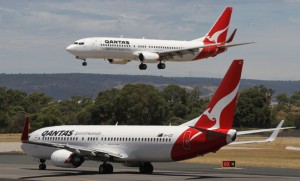
A breakdown of the airline’s results saw Qantas Domestic report an underlying EBIT of $57 million, down from $218 million in the first half of FY2013, a figure the airline attributes to “competitor capacity growth in the domestic market” which it said “continued to outpace Qantas Group capacity growth.” It also blamed the drop on “a softening resources market, corporate account pricing pressure, and fuel and foreign exchange impacts.”
Qantas International reported an underlying EBIT loss of $262 million, compared to a loss of $91 million in the first half of FY13. The airline said “the trend of intense competitor capacity growth in the Australian international market” which is “well above the global average” resulted in “particularly strong yield pressure for Qantas’ Asian and European markets,” and also highlighted higher fuel prices because of the softer Australian dollar.
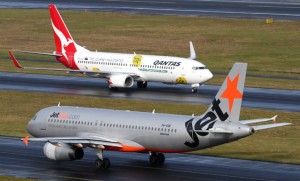
Jetstar also swung into the red, recording an underlying EBIT loss of $16 million, well down from an underlying EBIT profit of $128 million in the same period last year.
The airline attributed Jetstar’s performance to “competitive pressure on yields” in South East Asia, a $29 million share of associate losses, as well as fuel price and foreign exchange impacts, although it added that the airline’s Australian operations remained profitable.
On the plus side, the airline said it believes the “fundamentals of Jetstar’s low-cost carrier model remain strong” on the back of improvements in unit costs and ancillary revenues, that “customer advocacy is at record levels,”, and that the “introduction of the B787-8 into Jetstar’s long-haul network is delivering cost and customer service benefits.”
Also positive was the performance of the Qantas Loyalty division which logged a record underlying EBIT of $146 million, up from $137 million in the first half FY13. Qantas says the Loyalty business “continues to perform very strongly,” with billings and awards redemptions up, and “record customer advocacy.” It said there are currently 9.8 million Qantas Frequent Flyer members, and that it has a target of 10 million for the full year.
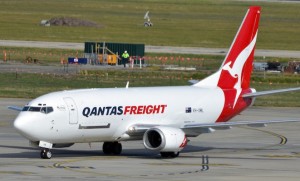
Qantas Freight also remained in profit, reported an underlying EBIT of $11 million which was half that recorded in the same period last year, which the airline attributed to “reduced capacity, consolidation and a weak global cargo market.”
The overall financial position of the airline remains strong, with liquidity of $3 billion comprising $2.4 billion in cash and $630 million in undrawn debt facilities as at December 31, and no major unsecured debt due to mature before April 2015.
The airline said about 30 per cent of its aircraft fleet is debt-free, and that it had added 31 new unencumbered aircraft since FY10 and with 20 mid-life aircraft due to become debt-free in FY14. It said the Group’s average passenger fleet age is currently 7.6 years, the youngest it has been in 20 years.
Qantas says the overall outlook for the Group remains “very challenging and volatile,” which it says is due to continuing “soft underlying domestic demand,” and depressed “domestic and international yields and loads.” It says the Group’s capacity is expected to increase by three to 3.5 per cent in the second half, while underlying fuel costs are expected to be approximately $4.6 billion in FY14.
The airline said that it was not possible to provide further profit guidance at this time “due to major transformation being undertaken by Qantas, the high degree of volatility and uncertainty in the competitive environment, global economic conditions, fuel prices and foreign exchange rates.”
“Qantas has been undertaking its biggest ever transformation over the past four years, cutting comparable unit costs by 19 per cent over four years, but this is not enough for the circumstances we face now,” Joyce said. “With structural economic changes being exacerbated by the uneven playing field in domestic aviation, we must now take actions that are unprecedented in scope and depth. We will accelerate our Qantas Transformation program to achieve $2 billion in cost reductions by FY17. Hard decisions will be necessary to overcome the challenges we face and build a stronger business.”




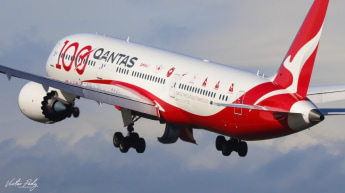











J
says:so did alan joyce announce his resignation?
australianaviation.com.au
says:No. The details on the restructure are coming shortly in a separate post.
Cheers
Andrew
Glen
says:Its interesting to see Joyce blaming other airlines for QANTAS huge failure to compete. Also of course blaming fuel prices as normal some other airlines manage to turn in a profit and they pay the same for jet fuel so that is a another poor excuse for bad managment . They seem to have a list of excuses they use every time they have to talk about how much they lost or how many more jobs they are going to cut this time. Stop with the excuses Joyce and leave that is what I am sure a lot of his employees are thinking I am sure of that
David VG
says:Surely Alan Joyce Must Resign! I am a CEO of a small business and if I were to record a $1 loss I would be GONE!
David Carter
says:Qantas has many problems, not the least of which is trying to operate in the 21st century while carrying the baggage of Ben Chifley and Labor’s 1940 plans to nationalise air transport. When another Labor PM, Paul Keating, privatised the airline, he needed to make the sale palatable to the old socialists in the party. In doing so, he burdened the airline with a unique set of restrictions that would inevitably cripple the airline. That said, Qantas management hasn’t helped by its poor equipment decisions driven by a delusion the airline is still a major player in global air transport. They should have bought highly efficient and flexible Boeing 777s and not cumbersome Airbus A380s. The A380 would have been the natural evolution for the old Qantas, the regulated, protected, national flag-carrier guaranteed half of all international traffic out of Australia. But the world’s changed. And Qantas hasn’t.
PeterL
says:David Carter well said!
Alan Joyce is dealing with the legacy of the old management regime, the A380 and no 777s. I am going to point out the obvious as it seems very few are seeing it! Qantas has large institutional investors who would have got rid of Alan Joyce ages ago if they thought he was not doing a good job!!!
These institutional investors have been backing Joyce for a few years now while he takes a dinosaur of an airline and transforms it into a modern airline that can compete on the world stage. Qantas could go down the AirNZ route and go broke, then reform with competitive worker agreements etc to reduce the cost base.
Alan Joyce is trying to avoid the AirNZ route to restructure but it needs to be given time as it will not happen overnight, and remember the institutional investors are backing Joyce in this strategy. These institutional investors know way more about this than we do and they are backing this up by putting their money where their mouth is so to speak, are you?
As David Carter said the Qantas sale act is crippling them, and it needs to go now!
And on a final note to show what Qantas is up against, Virgin sends its E190s to Portugal for heavy maintenance, that is how bad the costs are here in Australia. Why shouldn’t Qantas be able to do the same if it makes them competitive?